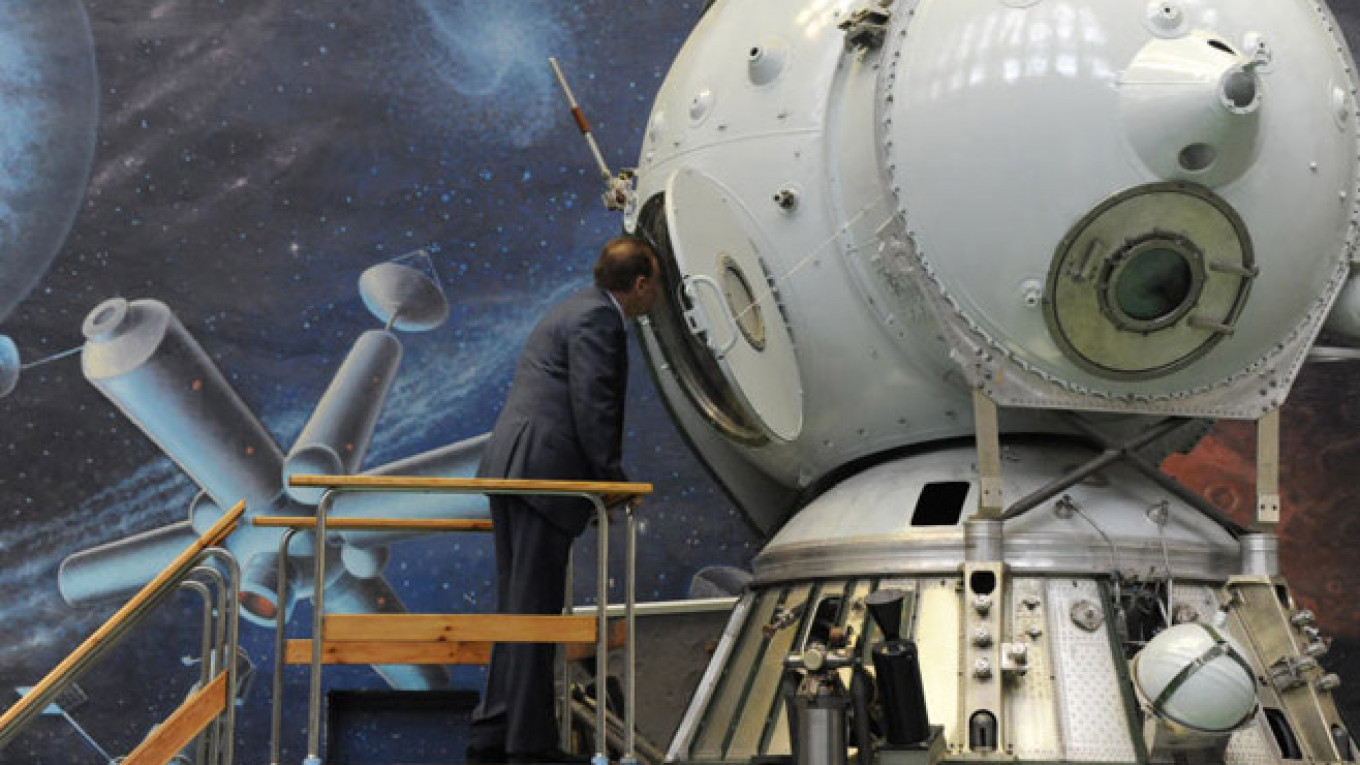The recent change of leadership in the Federal Space Agency (Roscosmos) and the announcement of plans to merge that agency with the United Rocket and Space Corporation (URSC) suggests at first glance, that chaos reigns in the Russian space industry.
However, a closer look reveals that the aerospace industry is simply fighting for survival. It is forcing the government to give it even more money — that it will immediately swallow up — and now it even wants to decide independently what equipment the state will order from it.
Of course, this reflects not only a struggle for survival by particular aerospace companies, but also that certain ruling circles are struggling for influence and control over financial flows. And it goes without saying that such infighting excludes any consideration of the interests of the public, the country or the advancement of science.
Deputy Prime Minister Dmitry Rogozin began speaking of reforms to the space industry back in 2012. The ostensible reasons for his concern were obvious: missile and rocket launches were failing too frequently and even equipment sent into space was breaking down. The federal space program has been in a state of crisis and near complete collapse ever since 2006, but the official reports issued by aerospace companies reveal the true extent of the problem.
From 2006 to 2014, federal space agency expenses increased by five times, whereas revenues for the industry leaders rose by only two or three times. What's more, those companies' short-term debt grew at a comparable rate, sometimes matching or even exceeding the size of their annual revenues.
Needless to say, their profits increased at an only modest pace at best, and their profitability from product sales stood at a very low 10.5 percent. They also suffered enormous losses due to inflation, with the result that almost all of the largest companies should rightfully undergo optimization, if not bankruptcy.
The authorities found no better solution to this problem than the decision in 2014 to merge the URSC with Roscosmos, gathering practically every state-controlled aerospace enterprise under one roof. That will not happen quickly because the bureaucrats are haggling over who will keep their jobs, how to exchange company shares and how to distribute government contracts between the various businesses, especially if they produce competing or even the same parts.
Clearly, this decision will not solve the problems of Russia's aerospace industry, but the ruling regime, with its current political and economic structure, is in no condition to try anything else. At issue here are not only the institutional, economic and social problems associated with any attempt to make real improvements to the aerospace industry, but also the very foundation of the legitimacy of President Vladimir Putin's regime.
With the creation of another industry "behemoth," the size of the overall pie grows smaller, government spending on aerospace gets channeled down a narrower conduit and those who manage to tap into that flow will grow both wealthier and more powerful. The close associates of state defense firm Rostec head Sergei Chemezov are the main beneficiaries of this restructuring, and heading that team is Igor Komarov, the head of URSC and now the head of the new Roscosmos.
In addition, Deputy Prime Minister Dmitry Rogozin, who oversees the defense industry — where Rostec figures prominently — seems to have done a good job promoting the interests of that team in recent years. In other words, the same few people will continue to control the annual allocation of hundreds of billions of rubles of state spending.
The finishing touch in this picture is the decision to merge the URSC with Roscosmos, with both now under the name of the latter. Aside from the fact that the authorities worked out the important reforms in backroom deals and carried out the restructuring like a "special op," there are already serious consequences to their actions.
The main result of the current reforms is that the space industry will now decide for itself what the state will request from it. The main purpose of the revamped federal space program is not to produce what Russia needs in space, but to churn out whatever the state aerospace corporation itself wants and is able to produce. It now exists only in order to receive government funding.
It thus becomes completely clear why, even after the space industry lost an entire decade with nothing to show for it, the plans for its future activities are made in such a chaotic fashion. Why have those officials suddenly announced plans to create a national space station, and why do they periodically discuss missions to the moon and Mars — both crazy and absolutely infeasible under current conditions — or the creation of a means for protecting Russia from asteroids?
The answer: not in order to actually build them, but to obtain the government funding for them. In fact, the space industry is incapable of developing or building anything new. It has lost its ability to participate in the world market or to provide meaningful cooperation on international technology projects. Now it can do one thing: present bills to the government for ever increasing costs.
The Angara rocket finally made its first test flight after 20 years of research, development and funding, but little demand is expected for it as a commercial launch vehicle.
Meanwhile, engineers are several years behind schedule in building orbital modules intended for the International Space Station — but at least they will find some use once they are finished. But the question remains as to how any of these projects advance fundamental space research.
Pavel Luzin is a lecturer at Perm University.
A Message from The Moscow Times:
Dear readers,
We are facing unprecedented challenges. Russia's Prosecutor General's Office has designated The Moscow Times as an "undesirable" organization, criminalizing our work and putting our staff at risk of prosecution. This follows our earlier unjust labeling as a "foreign agent."
These actions are direct attempts to silence independent journalism in Russia. The authorities claim our work "discredits the decisions of the Russian leadership." We see things differently: we strive to provide accurate, unbiased reporting on Russia.
We, the journalists of The Moscow Times, refuse to be silenced. But to continue our work, we need your help.
Your support, no matter how small, makes a world of difference. If you can, please support us monthly starting from just $2. It's quick to set up, and every contribution makes a significant impact.
By supporting The Moscow Times, you're defending open, independent journalism in the face of repression. Thank you for standing with us.
Remind me later.








